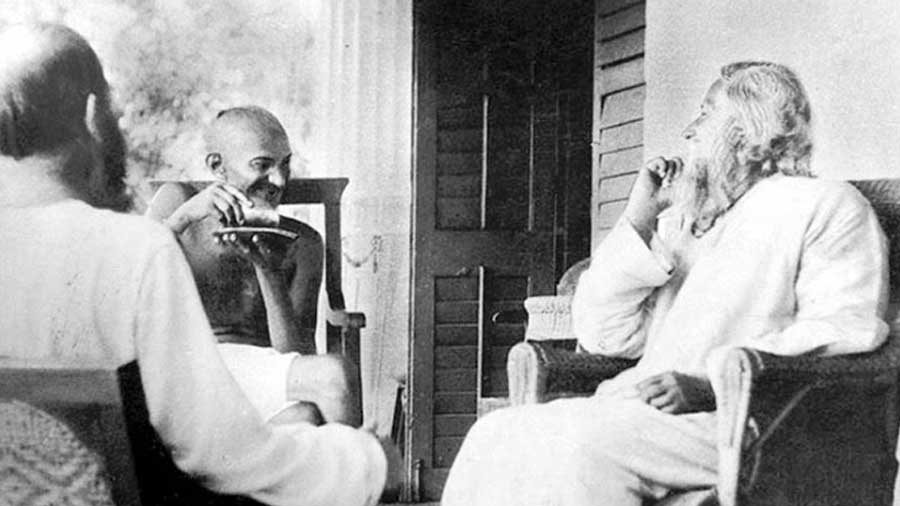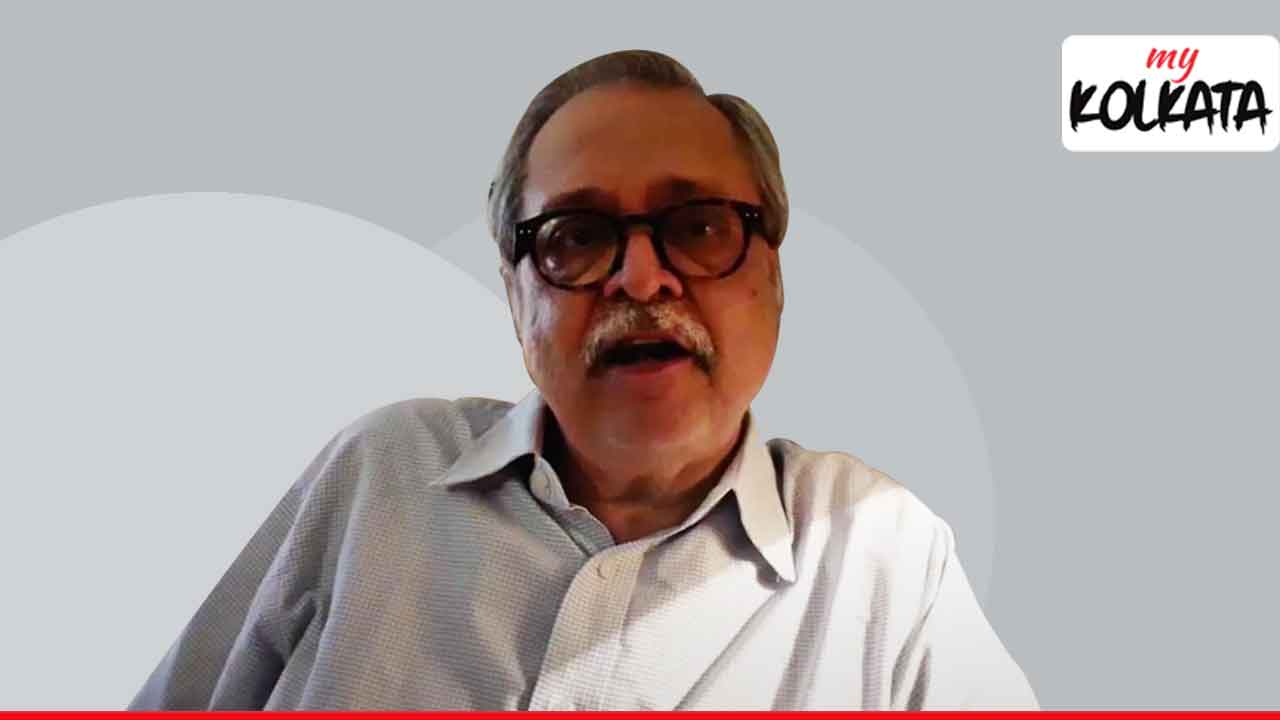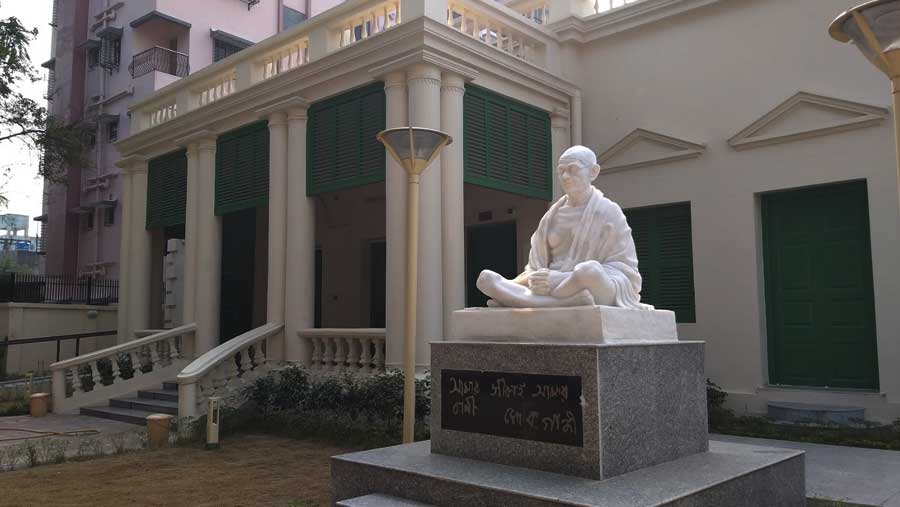Early in the morning of 4 January 1932, Gandhi was arrested and lodged in Yerwada Prison again. A few hours before his arrest, he reached out to Rabindranath: ‘Dear Gurudev, I am just stretching my tired limbs on the mattress as I try to steal a wink of sleep, I think of you. I want you to give your best to the sacrificial fire that is being lighted.’ Those few words and the timing of the letter are eloquent testimony of the relationship between the two men.
On 17 August 1932, when Gandhi was still in prison, the British prime minister, Ramsay MacDonald, made the announcement that the Depressed Classes, like the Muslims
and the Sikhs, would be considered a ‘minority community’ and would thus be entitled to a separate electorate. Gandhi had opposed these demands from the very beginning and when he heard of MacDonald’s announcement — the ‘Communal Award’ as it came to be known — he informed the prime minister that in protest he would undergo a fast unto death beginning from 20 September.
The day before the fast was to commence, Rabindranath sent a telegram to Gandhi in which he said: ‘It is worth sacrificing precious life for the sake of India’s unity and her social integrity. Though we cannot anticipate what effect it may have upon our rulers, who may not understand its immense importance to our people, we feel certain that the supreme appeal of such self-offering to the conscience of our own countrymen will not be in vain. I fervently hope that we will not callously allow such national tragedy to reach its extreme length. Our sorrowing hearts will follow your sublime penance with reverence and love.’
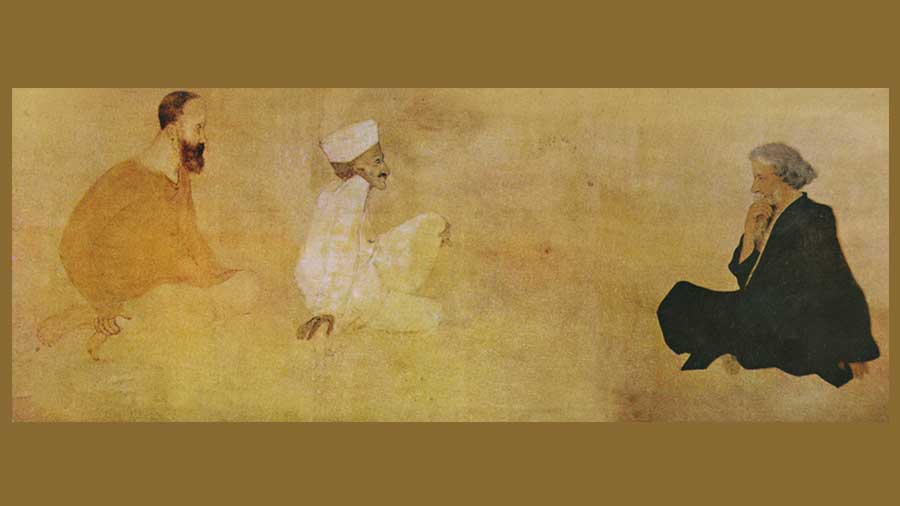
Tagore, Gandhi and British missionary Charles Freer Andrews discussing the non-cooperation movement in Calcutta on September 6, 1921, a watercolour by Abanindranath Tagore National Library
Gandhi: I want your blessing. It will sustain myself
Before Gandhi had received this cable, he wrote to Rabindranath a very poignant letter:
‘Dear Gurudev, This is early morning 3 o’clock of Tuesday, I enter the fiery gate at noon. If you can bless the effort, I want it. You have been to me a true friend because you have been a candid friend often speaking your thoughts aloud. I had looked forward to a firm opinion from you, one way or the other. But you have refused to criticise. Though it can now only be during my fast, I will yet prize your criticism, if your heart condemns my action. I am not too proud to make an open confession of my blunder, whatever the cost of the confession, if I find myself in error. If your heart approves of the action I want your blessing. It will sustain myself. I hope I have made myself clear. Love.’
As he was about to send off this letter, he received Rabindranath’s wire and added, ‘I got your loving and magnificent wire. It will sustain me in the midst of the storm I am about to enter.’ After despatching the letter, Gandhi sent a telegram to Rabindranath: ‘GURUDEV HAVE ALWAYS EXPERIENCED GOD’S MERCY. VERY EARLY THIS MORNING I WROTE SEEKING YOUR BLESSING IF YOU COULD APPROVE ACTION AND BEHOLD I HAVE IT IN ABUNDANCE IN YOUR MESSAGE JUST RECEIVED. THANK YOU.’
On the morning of 20 September, Rabindranath prayed in Santiniketan and in the course of his upasana (worship/prayer) he said that the person who over a very long period through the tapasya of suffering has made the entire country genuinely his own, that Mahatma, has now embraced death on behalf of all of us.
Rabindranath highlighted to the gathering that Gandhi was prepared to face death to dismantle a system that had ‘banished a considerable number of our own people into a narrow enclosure of insult branding them with the sign of permanent degradation.’ On 23 September, Rabindranath wrote to Mahadev Desai enquiring about Gandhi’s condition. On the same day Gandhi wrote to Rabindranath ‘...indeed come if your health permits’.
Bapuji raised himself up a little bit, and affectionately embraced Tagore
The next day Rabindranath left for Poona. He arrived two days later and without any delay he went to see Gandhi who was lying on a cot under a mango tree in the yard. The moving scene was recorded by an eyewitness thus: ‘bent with age and covered with a flowing cloak [Rabindranath] proceeded step by step very slowly to greet Gandhiji who was lying in bed. Bapuji raised himself up a little bit, and affectionately embraced Tagore, and then began to comb his white beard with his shaking fingers, like a child.’
Pyarelal wrote, ‘Without a word, he approached Gandhiji’s prostrate form and burying his face in the clothes on Gandhiji’s breast, remained in that position for several minutes overcome with feeling.’ Rabindranath himself left an account of this meeting. He wrote, ‘Mahatmaji embraced me with both arms and pulled me to his breast and kept me there for some time.’
After a series of discussions and negotiations, an understanding was reached between Gandhi and Ambedkar which the government accepted. Following this on 26 September, Gandhi broke his fast in the presence of Rabindranath who sang Jibana jhokhono shukaye jaye… (when life is dry and parched) from Gitanjali. Recalling the occasion, Rabindranath wrote, ‘I had forgotten the tune. I sang with an impromptu tune.’
Later that day, Gandhi issued a statement to the press in which he said: ‘The fast undertaken in the name of the God was broken in the presence of Gurudev, and Parachure Shastri, the leper prisoner and a learned pandit, seated opposite each other, and in the company of loving and loved ones who had gathered round me. The breaking was preceded by the Poet singing one of his Bengali hymns, then mantras from the Upanishads by Parachure Shastri, and then my favourite hymn Vaishnava Jana.’
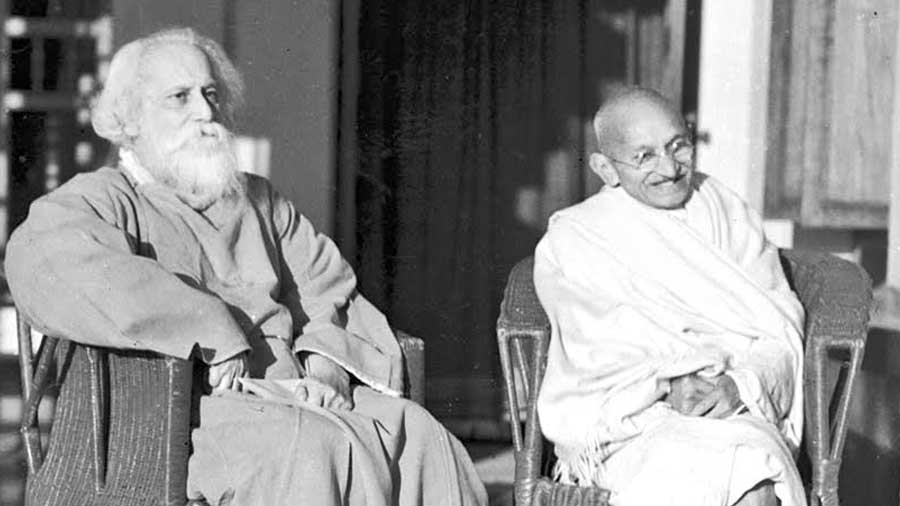
Tagore with Gandhi TT archives
Tagore: His dwelling is in the heart of the untold multitude
That year, Gandhi’s birthday according to the Indian calendar fell on 27 September. In a ceremony to mark that occasion, Rabindranath delivered a speech which is not noted very often
even though the speech reveals his deep affection and respect for Gandhi…. In his speech, Rabindranath…. described Gandhi’s life as ‘a constant call to us to emancipation in service and self-dedication.’ Rabindranath continued: ‘We know that, in the Upanishads, the God who ever dwells in the hearts of all men has been mentioned as Mahatma. The epithet is rightly given to the Man of God whom we are honouring today, for his dwelling is not within a narrow enclosure of individual consciousness. His dwelling is in the heart of the untold multitude who are born today in India and who are yet to come, and this greatness of his soul, which has power to comprehend other souls, has made possible what never has yet happened in our history, when even, masses have been roused to the great fact that India is not merely a geographical entity but is a living truth in which they live and move and have their being….’
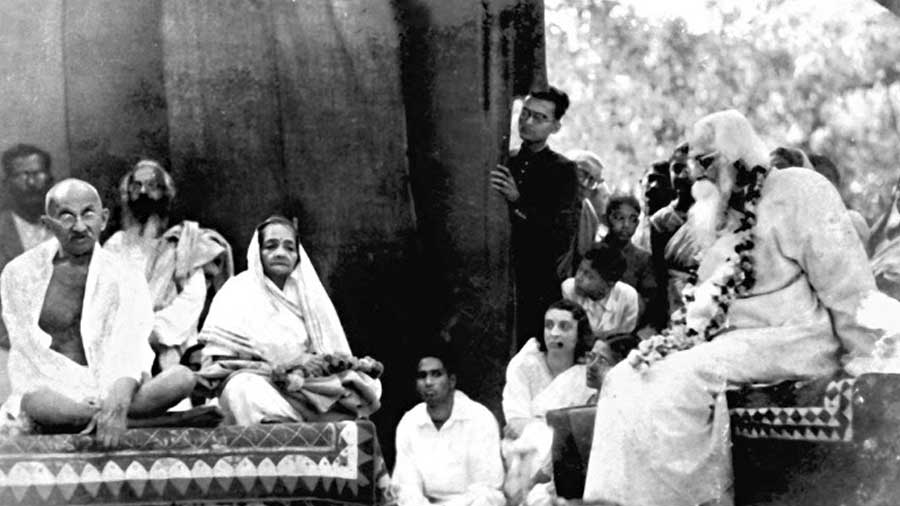
Tagore with Mahatma Gandhi and Kasturba Gandhi at Santiniketan ABP archive
On his return to Santiniketan, Rabindranath wrote to Gandhi not merely expressing his relief that Gandhi had been saved but also to tell him that, ‘Now is the opportune moment when a definite command from you will rouse the Hindu community to make a desperate effort to win over the Mahommedans to our common cause.’
Rabindranath felt that Hindu-Muslim unity was more difficult to achieve than the removal of untouchability because ‘there is a deep-rooted antipathy against the Muslims in most of our people and they also have not much love for ourselves.’ In spite of these prejudices, Rabindranath believed that Gandhi knew ‘how to move the hearts that are obdurate’ and that Gandhi had the ‘patient love that can conquer the hatred that has accumulated for ages.’ He told Gandhi ‘nothing can be too costly which would enable us to win their confidence and convince them that we understand their difficulties and their point of view.’
Gandhi replied to thank Rabindranath for a ‘beautiful letter’. He wrote, ‘I am daily seeking light. This unity between Hindus and Muslims is also a life’s mission.’
(This extract from Tagore and Gandhi: Walking Alone, Walking Together is used by permission of Aleph Book Company © Rudrangshu Mukherjee 2021)
